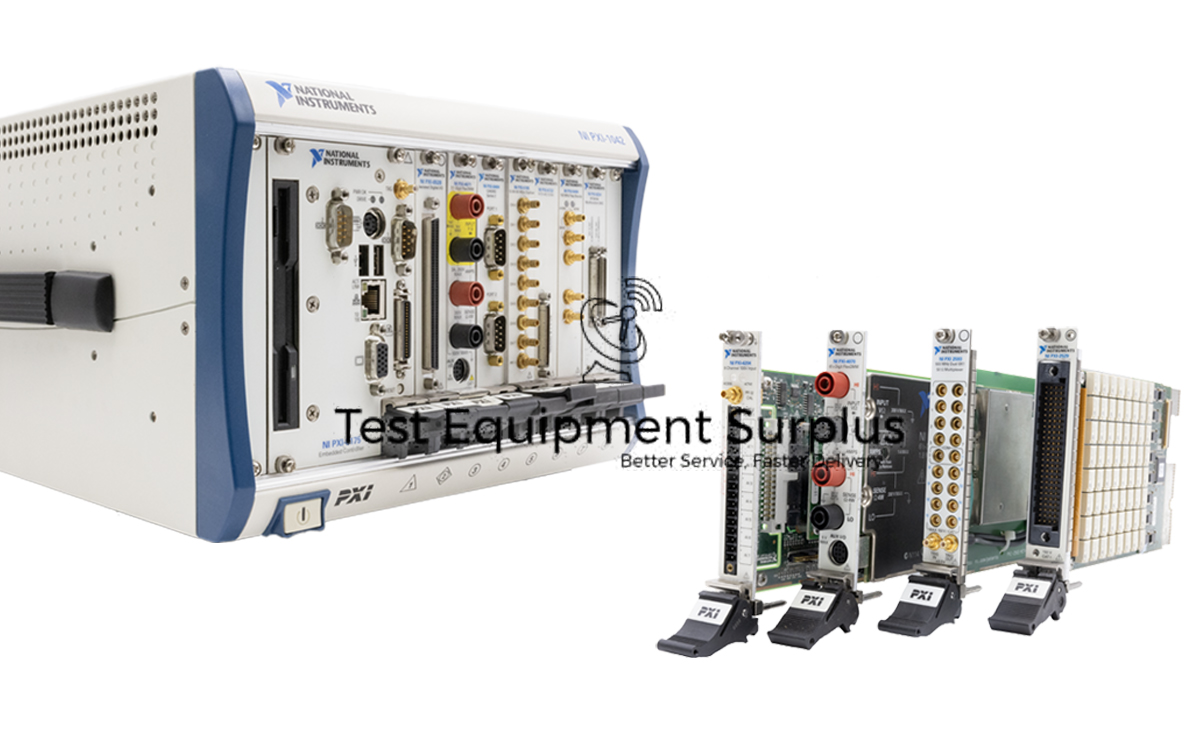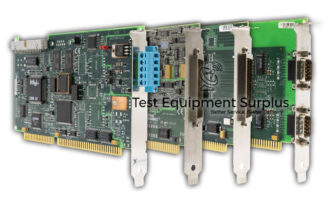Description
The National Instruments PXI-5673 is a high-performance RF Vector Signal Generator that offers a vast frequency range from 5 MHz to 6.6 GHz, making it suitable for a variety of applications. With an RF bandwidth of more than 100 MHz and RF power exceeding 10 dBm, this device is capable of handling demanding signal generation tasks.
It supports a myriad of modulation types, including ASK, FSK, AM, FM, QAM, and more, providing users with the flexibility to generate complex signal patterns. The device utilizes an advanced upconversion technique by directly converting differential baseband Q and I signals to RF frequencies.
One of the standout features of the PXI-5673 is its RF List Mode, which allows for deterministic and fast RF configuration changes, optimizing testing efficiency. Users can benefit from a swift waveform download rate of up to 800 MB/s, which significantly reduces the time required for waveform transfer.
Additionally, the PXI-5673 is designed for scalability, with the ability to synchronize up to four vector signal generators for the generation of phase-coherent signals, ideal for MIMO and beamforming applications. The stream-from-disk feature facilitates the generation of continuous waveforms that can extend to several terabytes in length, catering to long-duration signal simulation requirements.
Compatible with both open-loop and closed-loop scenarios, the PXI-5673 is versatile for use in various testing environments. It is available with two memory options; the base version includes 128 MB of onboard memory, with an upgraded version offering 512 MB for more extensive data handling capabilities.
| Specification | Details |
|---|---|
| Product | National Instruments PXI-5673 Vector Signal Generator |
| Type | RF Vector Signal Generator |
| Frequency Range | 5 MHz to 6.6 GHz |
| RF Bandwidth | > 100 MHz |
| RF Power | > 10 dBm |
| Modulation Types | ASK, FSK, AM, FM, QAM, etc. |
| Upconversion Technique | Direct RF upconversion from differential baseband Q and I signals |
| RF List Mode | Supported for deterministic and fast RF configuration changes |
| Waveform Download Rate | Up to 800 MB/s |
| Phase-Coherent Signal Generation | Up to 4 synchronized vector signal generators |
| Stream-from-Disk Feature | Generation of continuous waveforms up to several terabytes in length |
| Operating Modes | Open-loop and closed-loop scenarios |
| Memory Options | 128 MB onboard (base version), 512 MB version available |
Question 1: What is the frequency range and RF bandwidth of the National Instruments PXI-5673 RF Vector Signal Generator, and how does its RF List Mode benefit testing efficiency?
Answer 1: The key features and capabilities of the National Instruments PXI-5673 RF Vector Signal Generator that make it suitable for MIMO and beamforming applications include its wide frequency range of 5 MHz to 6.6 GHz, RF bandwidth of over 100 MHz, the ability to synchronize up to four vector signal generators for phase-coherent signal generation, and its RF List Mode for fast and deterministic RF configuration changes.
Question 2: What are the potential applications and benefits of the National Instruments PXI-5673 RF Vector Signal Generator’s wide frequency range and high-speed waveform download capability?
Answer 2: The National Instruments PXI-5673 RF Vector Signal Generator has a frequency range of 5 MHz to 6.6 GHz and an RF bandwidth of more than 100 MHz, and its RF List Mode benefits testing efficiency by allowing for deterministic and fast RF configuration changes, significantly optimizing the testing process.
Question 3: What modulation types does the National Instruments PXI-5673 RF Vector Signal Generator support, and how does its memory options cater to different data handling requirements?
Answer 3: The National Instruments PXI-5673 RF Vector Signal Generator’s wide frequency range from 5 MHz to 6.6 GHz enables it to be used in diverse applications such as wireless communications, radar testing, and electronic warfare simulation, while its high-speed waveform download capability of up to 800 MB/s benefits users by significantly reducing the time needed for waveform transfer, thus enhancing the efficiency of testing processes and enabling faster iterations during development and validation of RF systems.
Question 4: What are the capabilities and features that make the National Instruments PXI-5673 RF Vector Signal Generator suitable for a wide range of applications, including its frequency range, modulation support, and scalability options?
Answer 4: The National Instruments PXI-5673 RF Vector Signal Generator supports a variety of modulation types, including ASK, FSK, AM, FM, and QAM, and it caters to different data handling requirements with two memory options: a base version with 128 MB of onboard memory and an upgraded version offering 512 MB for more extensive data handling capabilities.
Question 5: What are the key features and capabilities of the National Instruments PXI-5673 RF Vector Signal Generator that make it suitable for MIMO and beamforming applications?
Answer 5: The National Instruments PXI-5673 RF Vector Signal Generator is suitable for a wide range of applications due to its expansive frequency range of 5 MHz to 6.6 GHz, support for numerous modulation types like ASK, FSK, AM, FM, and QAM, and the ability to synchronize up to four units for phase-coherent signal generation, along with features such as RF List Mode for fast configuration changes, a high waveform download rate, and an optional increased memory capacity, enhancing



